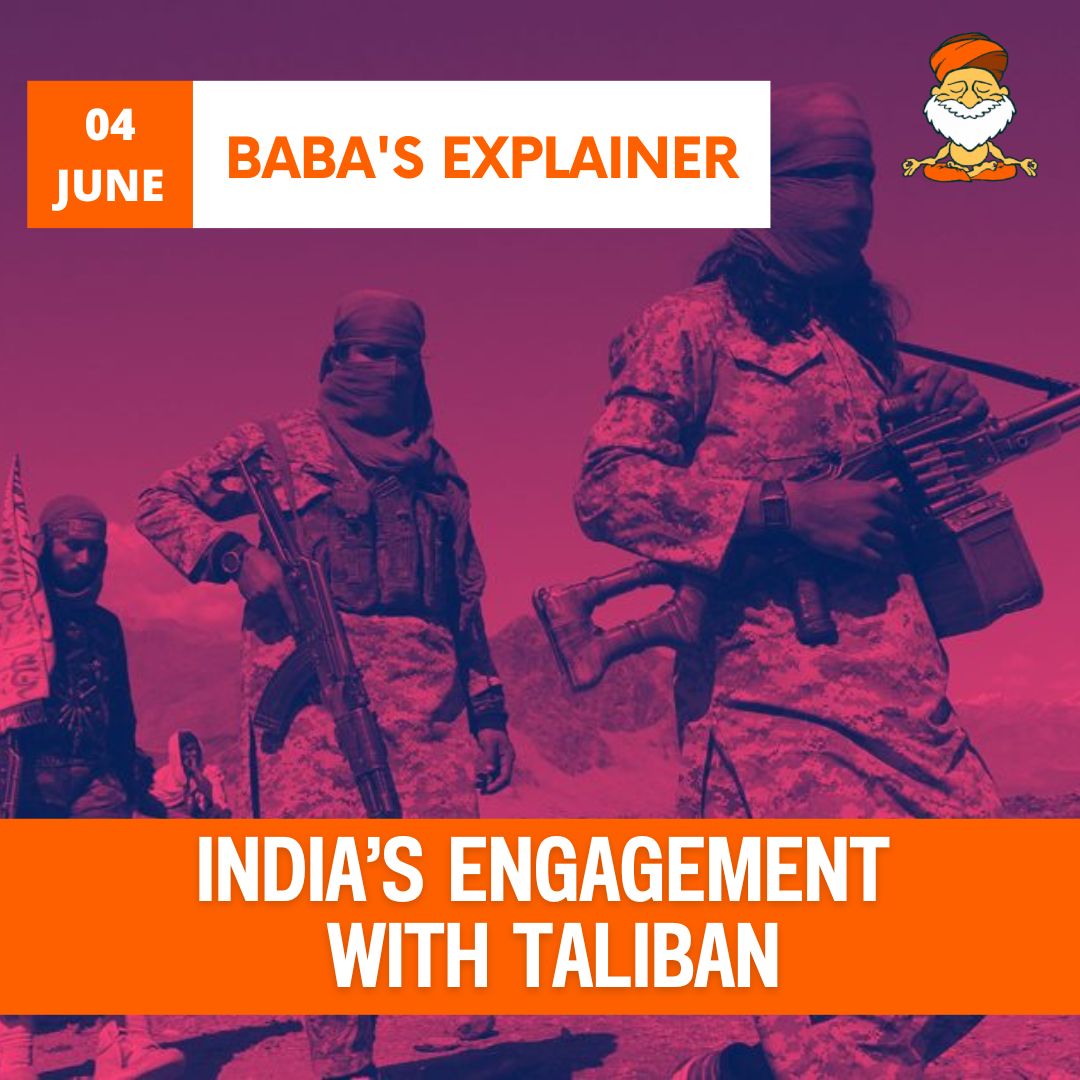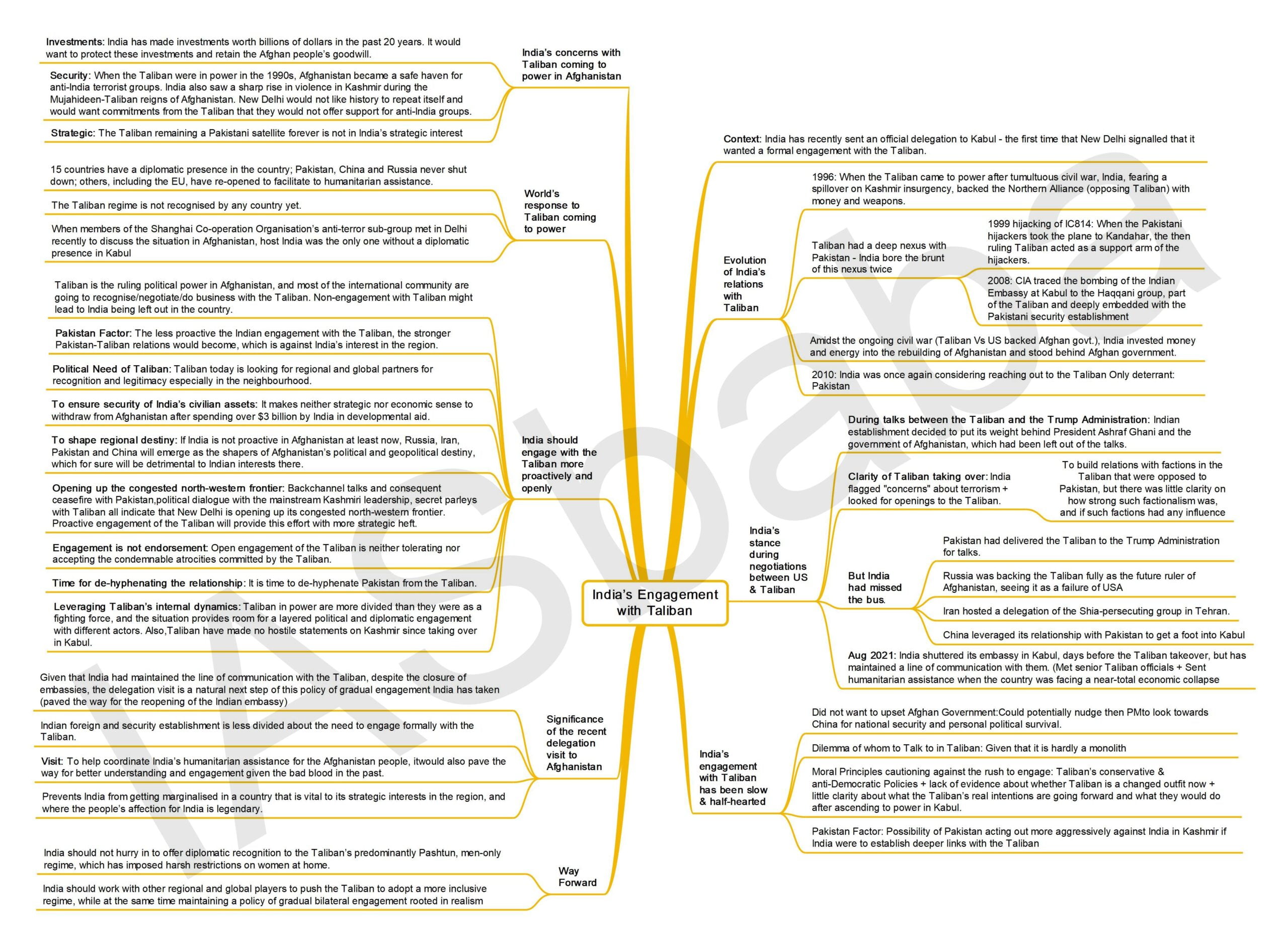International Relations
Syllabus
- GS-2: Government policies and interventions for development in various sectors and issues arising out of their design and implementation.
- GS-3: Cyber Security
Context: India has recently sent an official delegation to Kabul, it was the first time that New Delhi signalled that it wanted a formal engagement with the Taliban.

How has India’s relations with Taliban evolved over the years?
- In 1996, when the Taliban came to power after tumultuous civil war, India, fearing a spillover on Kashmir insurgency, backed the Northern Alliance (opposing Taliban) with money and weapons.
- Taliban had a deep nexus with Pakistan and India bore the brunt of this nexus twice.
- During the 1999 hijacking of IC814, when the Pakistani hijackers took the plane to Kandahar, the then ruling Taliban acted as a support arm of the hijackers.
- Second, in 2008, the CIA traced the bombing of the Indian Embassy at Kabul to the Haqqani group, part of the Taliban and deeply embedded with the Pakistani security establishment. The bombing was reported to have been carried out at the orders of the ISI.
- With 9/11 and eventual US invasion of Afghanistan with the objective of eliminating terrorists, Taliban was ousted from power and a new Afghan government was installed under US security umbrella.
- Amidst the ongoing civil war (Taliban Vs US backed Afghan govt.), India invested money and energy into the rebuilding of Afghanistan and stood behind Afghan government.
- While Pakistan which had a huge role in the birth of the Taliban, had given Taliban leaders sanctuary after the 2001 US invasion, continued to support Taliban with money and weapons
- But by 2010, with increasing doubts about the US continuance, India was once again considering reaching out to the Taliban.
- Mullah Abdul Salam Zaeef, an Afghan diplomat who was the Afghan ambassador to Pakistan during Taliban regime, made visits to India showing India keeping a door open to the Taliban.
- Reaching out to Taliban was considered necessary as New Delhi did not want to be left out or marginalised in the Afghanistan of the future
- But with Pakistan continuing to loom large, New Delhi did not have the will to pursue the plan seriously.
What was India’s stance when negotiations started between US & Taliban?
- After getting Osama bin Laden in Pakistan in 2011, the Obama Administration was getting ready to declare an end to the war, and the US and the Taliban had already made tentative contact towards talks.
- As talks between the Taliban and the Trump Administration took off, the Indian establishment decided to put its weight behind President Ashraf Ghani and the government of Afghanistan, which had been left out of the talks.
- When it became increasingly clear that Taliban would return to power, India flagged “concerns” about terrorism, even as it looked for a seat at the table in any of the several regional groups, and also for openings to the Taliban.
- One view was to build relations with factions in the Taliban that were opposed to Pakistan, but there was little clarity on how strong such factionalism was, and if such factions had any influence.
- An Indian diplomat who had been approached by a Taliban leader once in a foreign capital said talking to the Taliban was “the same as talking to the ISI”.
- It was evident that India had missed the bus.
- Pakistan had delivered the Taliban to the Trump Administration for talks.
- Russia was backing the Taliban fully as the future ruler of Afghanistan, seeing it as a failure of USA
- Iran, also glad at America’s defeat at the hands of the Taliban, hosted a delegation of the Shia-persecuting group in Tehran.
- China leveraged its relationship with Pakistan to get a foot into Kabul.
- India shuttered its embassy in Kabul in August 2021, days before the Taliban takeover, but has maintained a line of communication with them.
- In September 2021, India’s Ambassador to Qatar met Sher Mohammad Abbas Stanekzai, a senior Taliban official, at the Indian Embassy in Doha.
- In October 2021, Indian officials met the Taliban’s Deputy Prime Minister in Moscow at a regional conference on Afghanistan
- Later, New Delhi sent humanitarian assistance, including wheat, COVID-19 vaccines and winter clothes, to Afghanistan when the country was facing a near-total economic collapse.
What were the reasons that kept India’s engagement with Taliban Slow & Half-hearted?
- Did not want to upset Afghan Government:
- If New Delhi chooses to engage the Taliban directly, it could have made Afghanistan President Ashraf Ghani, thus far India’s trusted partner, uneasy.
- This could potentially nudge him to look towards China for national security and personal political survival.
- Dilemma of whom to Talk to in Taliban
- New Delhi faces difficulty as to whom to talk to within the Taliban given that it is hardly a monolith. New Delhi also had little access to the fighters on the ground in Afghanistan.
- Moral Principles cautioning against the rush to engage
- Taliban faced global criticism, including from India, in its earlier avatar for its conservative & anti-Democratic Policies.
- Due to lack of evidence about whether Taliban is a changed outfit now, New Delhi did not want to court the Taliban so soon.
- More so, there was little clarity about what the Taliban’s real intentions are going forward and what they would do after ascending to power in Kabul.
- Pakistan Factor
- There was always the possibility of Pakistan acting out more aggressively against India in Kashmir if India were to establish deeper links with the Taliban.
What are India’s concerns with Taliban coming to power in Afghanistan?
India has three main concerns when it comes to the Taliban’s return to Afghanistan.
- Investments: One, India has made investments worth billions of dollars in the past 20 years. It would want to protect these investments and retain the Afghan people’s goodwill.
- Security: Two, when the Taliban were in power in the 1990s, Afghanistan became a safe haven for anti-India terrorist groups. India also saw a sharp rise in violence in Kashmir during the Mujahideen-Taliban reigns of Afghanistan. New Delhi would not like history to repeat itself and would want commitments from the Taliban that they would not offer support for anti-India groups.
- Strategic: Three, the Taliban remaining a Pakistani satellite forever is not in India’s strategic interest.
How is the world responding to Taliban coming to power?
- Nine months after the Taliban took over Kabul, 15 countries have a diplomatic presence in the country.
- Pakistan, China and Russia never shut down; others, including the EU, have re-opened to facilitate to humanitarian assistance.
- The Taliban regime is not recognised by any country yet.
- When members of the Shanghai Co-operation Organisation’s anti-terror sub-group met in Delhi recently to discuss the situation in Afghanistan, host India was the only one without a diplomatic presence in Kabul.
Why India should engage with the Taliban more proactively and openly?
- Accepting the reality: Taliban is the ruling political power in Afghanistan, and most of the international community are going to recognise/negotiate/do business with the Taliban. Non-engagement with Taliban might lead to India being left out in the country.
- Pakistan Factor: The less proactive the Indian engagement with the Taliban, the stronger Pakistan-Taliban relations would become, which is against India’s interest in the region.
- Political Need of Taliban: Taliban today is looking for regional and global partners for recognition and legitimacy especially in the neighbourhood. Also, to balance its neighbour Pakistan, Taliban might be looking for India as its strategic partner.
- To ensure security of India’s civilian assets: It makes neither strategic nor economic sense to withdraw from Afghanistan after spending over $3 billion by India in developmental aid. Therefore, India needs to engage with Taliban to ensure security of its civilian assets.
- To shape regional destiny: If India is not proactive in Afghanistan at least now, Russia, Iran, Pakistan and China will emerge as the shapers of Afghanistan’s political and geopolitical destiny, which for sure will be detrimental to Indian interests there.
- Opening up the congested north-western frontier: Backchannel talks and consequent ceasefire with Pakistan, political dialogue with the mainstream Kashmiri leadership, secret parleys with Taliban all indicate that New Delhi is opening up its congested north-western frontier. Proactive engagement of the Taliban will provide this effort with more strategic heft.
- Engagement is not endorsement: Open engagement of the Taliban is neither tolerating nor accepting the condemnable atrocities committed by the Taliban.
- Time for de-hyphenating the relationship: India has de-hyphenated the Israel & Palestine relationships that is a pragmatic & the necessity in globalised multi-polar world order. There is growing view that it is time to de-hyphenate Pakistan from the Taliban.
- Leveraging Taliban’s internal dynamics: Taliban in power are more divided than they were as a fighting force, and that the situation provides room for a layered political and diplomatic engagement with different actors. Also, Taliban have made no hostile statements on Kashmir since taking over in Kabul. All these provides increased space for India to open its engagement with Taliban.
What is the significance of the recent delegation visit to Afghanistan?
- Given that India had maintained the line of communication with the Taliban, despite closure of embassies, the delegation visit is a natural next step of this policy of gradual engagement India has taken.
- With this, it appears that the Indian foreign and security establishment is less divided about the need to engage formally with the Taliban.
- Though the visit is only to help coordinate India’s humanitarian assistance for the Afghanistan people, it would also pave the way for better understanding and engagement given the bad blood in the past.
- The visit also prevents India from getting marginalised in a country that is vital to its strategic interests in the region, and where the people’s affection for India is legendary.
- Although recognition of the Taliban government is not on the cards yet, the recent visit has paved the way for the reopening of the Indian embassy, albeit a downgraded one.
What should be the way forward for India?
- New Delhi cannot pursue its economic and strategic interests if it does not engage with the Taliban. But, at the same time, India should not hurry in to offer diplomatic recognition to the Taliban’s predominantly Pashtun, men-only regime, which has imposed harsh restrictions on women at home.
- India should work with other regional and global players to push the Taliban to adopt a more inclusive regime, while at the same time maintaining a policy of gradual bilateral engagement rooted in realism.
Mains Practice Question – Why has India’s engagement with Taliban been reluctant and half-hearted? Should India go for full fledged recognition and engagement with Taliban?
Note: Write answers to this question in the comment section.
MIND MAP

DOWNLOAD MIND MAP – CLICK HERE












